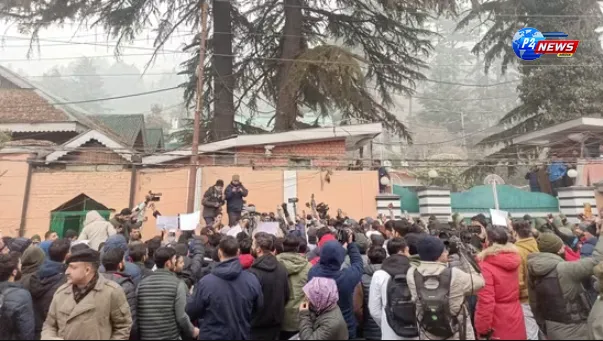The lieutenant governor's administration implemented a reservation policy for jobs and admissions prior to the assembly elections earlier this year, aiming to enhance equity and support for underrepresented groups in access to opportunities.
The lieutenant governor's administration implemented a reservation policy for jobs and admissions prior to the assembly elections earlier this year, aiming to enhance equity and support for underrepresented groups in access to opportunities.
A significant number of political figures and numerous students congregated outside the residence of Jammu and Kashmir Chief Minister Omar Abdullah, pushing for a reassessment of the reservation policy implemented by the administration led by the lieutenant governor earlier this year. This demonstration saw hundreds rallying together, including National Conference Member of Parliament Ruhulla Mehdi and various other political leaders, all united in their demand for a more balanced approach to the reservation policy.
Among the attendees was Ruhullah Mehdi, who actively participated in the protest on Gupkar Road, calling for a review that advocates for fairness in the reservation system. His social media post earlier in the day had sought public support for the cause. The protest also drew the involvement of opposition leaders like Waheed Para and Iltija Mufti from the People’s Democratic Party (PDP), as well as Sheikh Khurshi from the Awami Itihad Party.
Furthermore, Abdullah’s son joined the ranks of Mehdi and the protesting students, emphasizing the collective sentiment towards the reservation issue. Iltija Mufti took the opportunity to speak with the students and later informed members of the media, "Our presence here is not a political maneuver." She expressed concern that the political discourse in the valley has primarily centered around Article 370 and reinstating statehood, neglecting the pressing issues faced by the youth.
Mufti highlighted the fundamental demands of the students, indicating a necessity for an equitable reservation system that does not discriminate against any group. "The government, which came to power with a significant mandate and the promise to rationalize the reservation policy, should honor its commitments in a timely manner,” she asserted during her dialogue with reporters.
In response to the protest, Chief Minister Omar Abdullah later invited the students to his office for discussions, showcasing his willingness to engage with their concerns.
The reservation policy in question, sanctioned by the LG Manoj Sinha-led administration prior to the assembly elections, modified the allocation of reservation percentages, lowering those for the general category while increasing those for reserved categories in public sector job placements and academic admissions. One notable adjustment was the introduction of a 10 percent reservation for the Pahari community along with three other tribes, cumulatively raising the total under the Scheduled Tribe category to 20 percent. The policy also established 8 percent reservations for Other Backward Classes and incorporated 15 new castes into this category following recommendations made by the Socially and Educationally Backward Classes Commission.
The legislative approval in February extended reservations to the Pahari ethnic tribe, the Paddari tribe, Kolis, and Gadda Brahmins. Subsequently, in March, the Administrative Council convened under LG Sinha and resolved to amend the Jammu and Kashmir Reservation Rules of 2005 to align with the recently enacted Jammu & Kashmir Reservation (Amendment) Act, 2023, the Constitution's Scheduled Castes Order, and additional recommendations from the SEBC Commission.
This reservation policy has been met with considerable disapproval from both political leaders and students, escalating calls for its review and reversal across the valley. MP Ruhulla Mehdi indicated a potential reason for the lack of action by the new government, citing a disconnect regarding the distribution of responsibilities between the elected officials and the lieutenant governor’s office. He expressed confidence that resolution on the matter would come soon, as dialogue was ongoing.
In a proactive measure, the Jammu and Kashmir government established a three-member committee tasked with reviewing the reservation policy related to job placements and educational admissions. This committee includes notable members such as Health Minister Sakina Itoo, Forest Minister Javed Ahmad Rana, and Science and Technology Minister Satish Sharma. However, no specific timeline has been provided for the committee's findings.
Adding to the situation, the Jammu and Kashmir High Court has requested a response from the government within three weeks concerning a new petition challenging the reservation policy, amalgamating it with a prior case on the same subject.
Chief Minister Omar Abdullah addressed the concerns, affirming that while the committee has been established to scrutinize the reservation policy, his government remains committed to following the high court's directives on the matter. He acknowledged the sentiments surrounding the issue and reiterated that the JKNC is dedicated to evaluating all dimensions of its manifesto. Abdullah assured the public that the cabinet sub-committee has recently been formed to facilitate discussions with relevant stakeholders in order to meet these commitments.
The chief minister recognized the importance of the protests and the right to peaceful assembly, stating that the issue will not be ignored. He committed to providing a fair hearing for all voices involved, emphasizing the need for a thorough process to ensure a just resolution.
Like
Dislike
Love
Angry
Sad
Funny
Pray
'Trump Tracker: Tulsi Gabbard's Surprising Appointment as US Intelligence Chief
November 14, 20249th Ayurveda Day in Melbourne: A Celebration of Ayurvedic Innovations and Global Health Impact
November 10, 2024🍪 We Value Your Privacy and Experience Hi there! We use cookies to enhance your browsing experience, provide personalized content, and analyze site traffic. By continuing to use our site, you consent to our use of cookies.







Comments 0